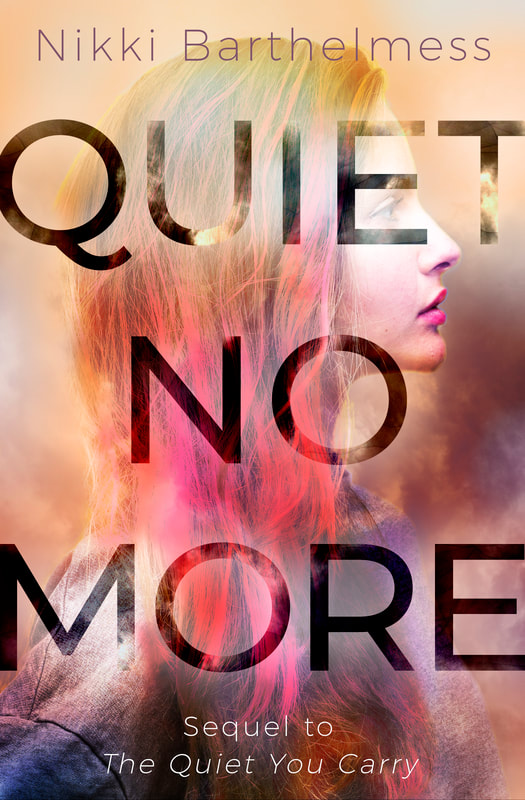|
We are thrilled to celebrate the book birthday of QUIET NO MORE by Nikki Barthelmess! But first, here is a little bit about the book: QUIET NO MORE... College freshman Victoria Parker is trying to move on with her life after surviving sexual assault by her father and six months in foster care. She's focusing on the positives--attending college, living on her own, repairing old relationships and making new ones, and getting involved with an abuse survivors activist group on campus. But everything's thrown into disarray when a strange woman shows up, claiming to be Victoria's aunt and asking Victoria to lie about what happened to her. With her father's sentencing in a few months, she's nervous about having to share the truth of what happened with a judge. She's not even sure if she has the strength to go through with it. But when her fellow club members begin pressuring her to speak out, Victoria has to decide how to share her story while remaining true to herself. Reina Luz Alegre: QUIET NO MORE is the sequel to THE QUIET YOU CARRY and picks up on Victoria Parker’s story, a sexual assault survivor. Can you tell us about the pressure Victoria feels both to keep quiet and to speak out about her assault? Nikki Barthelmess: In THE QUIET YOU CARRY, initially Victoria stays silent for many reasons. At times, she’s in denial, feels ashamed, or wants to protect her father. Once Victoria realizes her stepsister Sarah has been hurt, too, she makes the painful decision to come forward about the abuse. We pick up with Victoria’s story in QUIET NO MORE as she begins what she hopes is a new life for herself. She’s a college freshman focused on making new friends, and she joins a club that advocates for survivors of sexual harassment and assault. Despite Victoria’s efforts at prevention and advocacy, she struggles to write a victim impact statement that may affect her father’s sentencing. Although Victoria knows what her dad did to her was wrong, things get even more complicated after she learns he, too, was abused as a kid. Victoria wonders if she should downplay her father’s abuse so that he doesn’t suffer more in jail. Survivors sometimes care deeply for those who hurt them. This is especially true if they were abused by a family member or a romantic partner. Victoria learned before that keeping quiet not only hurt herself, it also meant that her stepsister Sarah remained in a dangerous home. Although Victoria isn't to blame for her father's actions, she feels guilty for what happened to Sarah. In QUIET NO MORE, Victoria has to decide who she’s speaking up for (or not) and why. Reina: How did the process of writing a college setting differ from writing a high school setting? Nikki: Writing a high school setting is a lot of fun because there’s so much anxiety and conflict that seems to permeate that time of life. Everything is changing. Everything feels so important. Being a teenager is a lot, and all that tension gives structure to a story. Similarly, I can’t think of a time when things are more in flux than when someone first moves out on their own. When you move away for school, you have to learn so much outside of the classroom on how to live as an adult. In QUIET NO MORE, as Victoria goes through a rough time, she reflects how before, under the strict rules of her foster mother, she wouldn’t be able to sit around and wallow. She’d have to clean the house or something. But now that she’s living on her own, she’s in charge of her own time and activities. Her friends live in different places—her best friend Christina moved to Washington, D.C. for college and her boyfriend Kale is still back home in high school. She’s making new friends and starting a new life for herself. So, basically everything is changing and Victoria doesn’t have her normal coping mechanisms, but she also has the freedom to make new ones. That is exciting but also daunting, so I tried to reflect that in the story. Reina: Any tips for writers who aim to write about sensitive, serious or painful subjects? Nikki: Whenever someone decides to write fiction that focuses on something sensitive, I think they should have a reason. Ask and answer an important question: Why am I the person who needs to tell this story? I’m not going to be the one to judge whether the reason is good, but I think writers should be careful about what stories we choose to tell, because there is the potential to do a lot of harm. When we share stories we have no business writing, we can hurt people who’ve lived the experiences we butcher. Additionally, we risk misinforming readers who don’t have an understanding of the subject matter. I’m not saying you can only write about things that have happened to you, otherwise we’d all be memoir writers. My stories are fiction. I am inspired by some things from my life, and I create the rest. I also research and consult people who have experience with what I write about. My advice is to be open to feedback, even if it involves hearing something you might not want to hear. Taking that guidance will often make the story better. So, my answer is to have a reason you should write the story, consult with others, and be open to correction. Reina: What do you hope QUIET NO MORE will mean to readers? Nikki: I don’t think people necessarily “get over” traumatic experiences, particularly being assaulted. I think our culture pushes people to move on in a way that encourages ignoring or trying to forget about pain. That retraumatizes people, in my opinion, and stunts healing. These kinds of experiences stay with survivors and shape who they become. That truth can be debilitating, but it can also be empowering. I hope readers see that the path to healing can involve growth but also setbacks. It can involve helping others, but it doesn’t have to. I want readers to realize it takes courage to face pain but that it’s worth it. Most importantly, I want readers to believe there’s always hope. Reina: Please tell us about any other writing project(s) or upcoming book(s)? Nikki: My next book, EVERYTHING WITHIN AND IN BETWEEN, comes out in the fall of 2021 from HarperChildren’s. It follows biracial teen Ri Fernandez as she fights to reclaim her Mexican heritage and her connection with her absent mother from her strict immigrant grandmother, who has kept her from both. Like THE QUIET YOU CARRY, this book draws from some of my experiences. Like Ri, I’m biracial—part Mexican American and white. I experienced some of the insecurities and issues Ri has with her identity and am very close with my immigrant grandma. This story means so much to me, and I’m excited to share it with readers! Thanks so much for your thoughtful questions, Reina! QUIET NO MORE is available from Indiebound, Barnes and Noble, and Amazon!  ABOUT NIKKI... Nikki Barthelmess is an author of young adult books, including THE QUIET YOU CARRY (Flux, 2019), QUIET NO MORE (Flux, fall 2020), and EVERYTHING WITHIN AND IN BETWEEN (HarperChildrens, fall 2021). Nikki entered foster care in Nevada at twelve and spent the next six years living in six different towns. During this time, Nikki found solace in books, her journal, and the teachers who encouraged her as a writer. A graduate of the University of Nevada, Reno, Nikki lives in Los Angeles with her husband and her pride-and-joy Corgi pup.
0 Comments
Leave a Reply. |
Las Musas SpeakWelcome to our blog! Archives
July 2024
Categories
All
|


 RSS Feed
RSS Feed